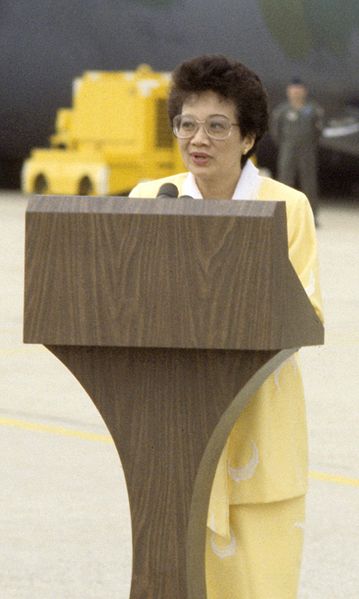Cory Aquino, President of the Republic of the Philippines, 1986-1992
 Just a few days ago on 1 August 2009, Corazon C. Aquino, 11th President of the Republic of the Philippines, died. She served as president of her nation for six years, from 1986 to 1992. She was the first female president of the Philippines, and was one of a remarkable line of Asian women (including Indira Ghandi in India, Benazir Butto in Pakistan, Mrs Bandaranaike in Sri Lanka, Khaleda Zia and Sheikh Hasina in Bangladesh, and Megawati Sukarnoputri in Indonesia) who have been leaders of their country in recent years.
Just a few days ago on 1 August 2009, Corazon C. Aquino, 11th President of the Republic of the Philippines, died. She served as president of her nation for six years, from 1986 to 1992. She was the first female president of the Philippines, and was one of a remarkable line of Asian women (including Indira Ghandi in India, Benazir Butto in Pakistan, Mrs Bandaranaike in Sri Lanka, Khaleda Zia and Sheikh Hasina in Bangladesh, and Megawati Sukarnoputri in Indonesia) who have been leaders of their country in recent years.
"Cory", as she became universally known as in the Philippines, came to office under dramatic circumstances. I have a vivid memory of hearing, one Sunday morning in August 1983 at home in Canberra, the incredible newsflash on ABC radio that her husband "Ninoy" Aquino had been brazenly assassinated at Manila airport. It seemed unbelievable. He had been gunned down, in broad daylight, while stepping onto the tarmac off the plane as he was returning from exile in the United States. Millions of Filipinos believed that the then-president of the Philippines, Ferdinand Marcos -- or his wife Imelda -- was behind the murder. In retrospect, it was the beginning of the end for Marcos. And in death, Ninoy Aquino became a much greater threat to Marcos than while he lived. Across the whole nation, Ninoy's memory became a symbol of freedom, and of resistance to the crumbling Marcos regime.
For the next two years, discontent with Marcos and his crony-led government increased. And then, in early 1986 in a desperate attempt to bolster his position, an increasingly embattled Marcos called elections. Reluctantly, with widespread public support, Cory Aquino took up her husband's political cudgels and agreed to run for the presidency.
Marcos rigged the elections and declared himself the winner. For a few tense days in February 1986, it looked as if he might hang on. But huge demonstrations in support of Cory began to spread across Manila. The streets of EDSA, the vital ring road that circles around Manila, were crammed with hundreds of thousands of people. Marcos resisted, calling out the tanks. And the crowds of "people's power" resisted as well, calling on the Filipino people for support. Pictures of large crowds of nuns from the Catholic Church defying the tanks in the streets of Manila were flashed around the world. And then the military deserted Marcos as well. It was clear that the game was up when top military figures Juan Ponce Enrile and Fidel Ramos withdrew their personal support for Marcos and called on him to resign.
Marcos soon fell. He fled the Malacanang palace by boat in a wretched dash across the narrow Pasay River to a waiting helicopter and sought asylum in the United Stages. Cory had won. She became the "people's president" of the Philippines.
Cory thus became an iconic leader and much-loved president of the Philippines. Her campaign colour, yellow, was seen everywhere in the months and years that followed. Her presidency was not always smooth sailing. Sections of the military sometimes openly opposed her. There were a number of attempted coups in Manila during the late 1980s which undermined economic confidence in the Philippines and greatly complicated the task of government of the nation. But none of the challenges to her presidency succeeded. She handed over power peacefully in scheduled elections in early 1992 to Fidel Ramos, one of the people who had delivered vital political support to her at the peak of the crisis six years earlier.
Cory Aquino led her nation with unbending courage in a time of great need. And she did so, emboldened by astonishing support from all quarters across the Philippines. The story of Cory's opposition to Marcos, her period as president, and the honoured place that she holds in the hearts of the Filipino people is now one of the most treasured parts of the history of the nation itself.

Comments
A touching and insightful article.
Posted by: Matt Anderson | August 9, 2009 06:35 PM
Cory Aquino will be missed.
Posted by: Hans Zerr | August 17, 2009 01:36 PM